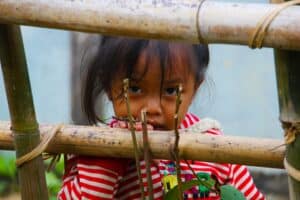
I am growing increasingly aware that we are living in the dystopian future, where the “new norm” is decidedly not normal and awful things that should shock me, simply don’t. My emotional reaction to horrific events barely registers, so I’m thinking a lot about combatting complacency. In just the last few weeks:
- Dozens of people were killed and hundreds injured in a mass shooting in Las Vegas. I was not surprised. Not even a small gasp.
- An in-depth expose of prison slave-labor camps that send drug offenders to work in chicken slaughterhouses should have left me feeling shaken. It just felt like Wednesday.
- Body-cam footage showing Utah police shoot Patrick Harmon in the back. The police had pulled Patrick over for riding a bike without a light. I’m outraged, but not shocked.
- A Hollywood producer whose work has a profound influence on culture has been sexually abusing women for decades. He has hundreds of millions of dollars and many awards to show for it. And it’s just another Friday.
- An instance of child abuse is reported every ten seconds in the United States. In the U.S. in 2015, approximately 1,670 children died from abuse or neglect. And our legal system is so deeply flawed, that a convicted child rapist can be awarded custody rights to a child borne from his heinous crime. That is our current reality.
- Climate change is killing people, but the people living in my country will still make 4.4 pounds of trash, per person, today. Wildfires and floods and bad air and food with decreasing nutritional properties are simply the new world order. God bless America?
And that’s through a U.S.-centric lens. Elsewhere in the world, aid workers are being killed in Afghanistan; half a million Rohingya Muslims have become refugees in the space of barely six weeks thanks to a violent, targeted campaign; and rape continues to be used as a weapon of war. It’s all so terrible, and yet I feel very little.
First Steps towards Combating Complacency
I guess if I was someone who took a “this world is not my home, I’m just passing through” approach to theology and life, I could throw my hands in the air, shrug my shoulders, and just try to make sure my little corner of the world was comfortable for me and mine.
But I’m not wired that way, and I wasn’t discipled by my parents, pastors, or church to let it all burn: “Little children, let us love, not in word or speech, but in truth and action.” (1 John 3: 18)
So, how do I get uncomfortable again? How can I let myself feel something, anything, in response to atrocity, without slipping into a total breakdown? How can I put love into action?
How can I let myself feel something in response to atrocity, without slipping into a total breakdown?
I’m starting by saying it: “This is not okay.” Humans may be prone to sin, but that state isn’t our last best hope: “Beloved, let us love one another, because love is from God; everyone who loves is born of God and knows God.” (1 John 4:7)
I’m going to ask where I’m complicit, or full of hate myself. I’m going to confess that sin, and I’m going to ask for the ability to love my enemies: “…for those who do not love a brother or sister whom they have seen, cannot love God whom they have not seen.” (1 John 4:20)
I’m going to learn to lament. Not in a self-centered, wallowing way, but in a way that answers Zakiya’s call to “Weep with me. Enter into the messiness…Let us rise together out of the ashes. Let education and lament ground us in truth—so that our actions may be ones that heal, restore and invoke justice.”
What will happen when I learn to lament in love? I cannot even imagine. What about you? What’s your response to the norm of tragedy?
Sarah Withrow King is the Deputy Director of Christians for Social Action, the co-director of CreatureKind, and the author of two books, Animals Are Not Ours (No Really, They’re Not): An Evangelical Animal Liberation Theology(Wipf & Stock) and Vegangelical: How Caring for Animals Can Shape Your Faith (Zondervan).


